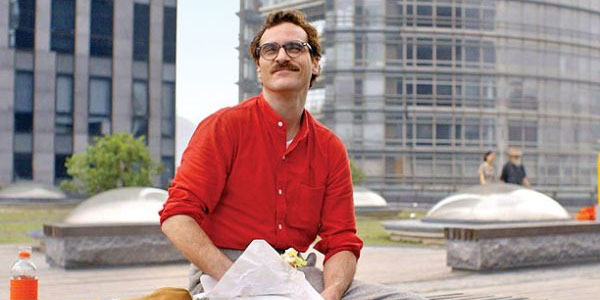Her Review

rating:4.5
Director Spike Jonze explores the worlds in his films so simply and beautifully, steering away from over-intellectualizing in order to find an emotional truth in complex ideas. This is why Charlie Kaufman's scripts were so attractive to him and why the films they made together were so effective; Jonze was able to take Kaufman's worldview and ground it in a tangible reality. Take the first Jonze/Kaufman collaboration, for example: Being John Malkovich presents the possibility of being able to live someone else's life for fifteen minutes at a time. Instead of focusing on all the ornate details that would be involved in order for any of this to make sense, we are simply forced to accept the concept as is. By doing this, the filmmakers are able to explore this world from the emotional point of view of its characters, which allows us to follow along with the story without having any technical reservations. All four of Spike Jonze's films thus far have centered around a character that chooses to enter another world, physically or mentally, while ignoring the harsh realities of their own life. In Adaptation, a screenwriter goes through dangerous lengths in order to follow the author of the novel he's adapting so he can get rid of his writer's block. Where the Wild Things Are features Max, a lonely child of divorced parents, as he sets sail down a pond which eventually leads him to a fantastical island of giant, monstrous creatures. Theodore Twombly, the lead character in Her, does not physically enter another world, but by beginning a serious relationship with an operating system, it is his way of disconnecting himself from his own reality. Her is the first film Spike Jonze wrote solely by himself and it's his most personal and revealing effort by far. Her is set a few years into the future. Our protagonist, Theodore (Joaquin Phoenix), lives in Los Angeles and makes his living writing personal letters for other people. Theodore's in the middle of going through a very difficult divorce; for months he has refused to sign the papers, as he's been unable to come to terms with the finality of his marriage. Theodore buys an artificially intelligent operating system (voiced by Scarlett Johansson) that calls "herself" Samantha, and who is not just designed to fit Theo's every need, but eventually winds up having her own wants and desires too. While Theo is baffled by Samantha at first, he soon finds himself connecting with her on a very deep, emotional level. They both feed off each other's presence and grow more attached with each passing day. Eventually, they fall in love. The lack of physicality in their relationship presents itself with a number of problems and it's fascinating to watch Spike Jonze explore their ups and downs. There have been many films that have explored the difficulties of relationships that are strictly physical, but Her might be the first film where the physical aspect is not possible. Theodore and Samantha can only connect via talking and sharing each other's ideas. They try to meet each other's sexual desires, but that only amounts to glorified phone sex. Samantha is everything Theo wants in a relationship, especially after his break-up, and Samantha finds herself longing to be with him in both mental and physical capacities. Once it's accepted that this is not possible, they slowly begin to grow apart, as Samantha becomes too intellectually demanding. Her is a film that's filled to the brim with ideas. For two hours, we basically live out the entirety of Theo's relationship as he begins to realize what it means to connect with someone in the first place. Theo falls in love with Samantha because he thinks she understands him, but that's the way she's programmed. He needs an emotional connection and Samantha provides that for him. But whereas humans tend to grow slowly over time, and can do it together, Samantha's mental capabilities grow at breakneck speeds. This fundamental flaw in their relationship underlines the unique ability we have, as human beings, to connect with each other. It's through this exploration of love and relationships that Her feels so personal. We can only speculate as to how closely Spike Jonze relates to his main character, but as social media has proven, we all have a desire to connect with people. We all wish to find someone who can understand us and accept us for who we are. But as Jonze demonstrates in the film, it's a two-way street. As necessary as it is to find someone who understands you, it's just as important to understand them. When Theo tries to look back at just what went wrong in his marriage, he admits he could have done more to make himself more emotionally available. Even if Samantha does not wind up being the love of his life, she is still the catalyst for Theo to be able to grow beyond the heartbreak and move on with his life. He ultimately realizes how much he needs a human connection in his life, even though it's so hard for him to let go of the connection he's made with Samantha.
 Her is released in the US on 10th January.
Her is released in the US on 10th January.